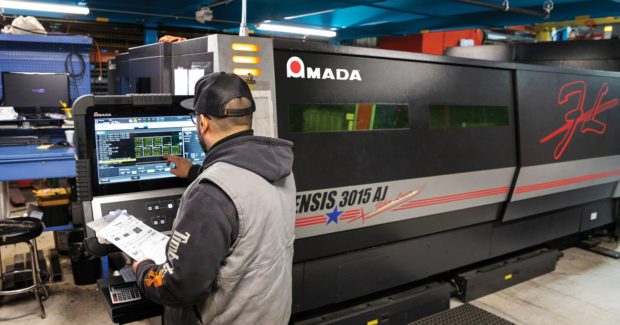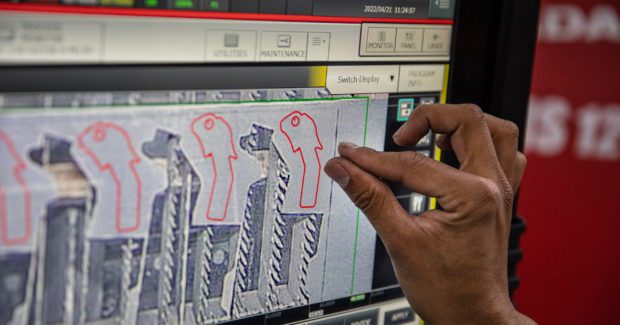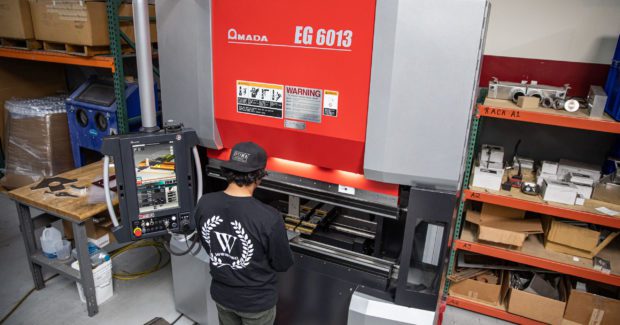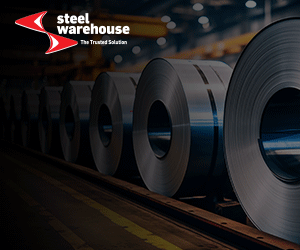AMADA’s Innovations Create Total Solutions Ensuring Customer Success
AMADA’s sheet metal fabrication equipment assists end users in generating more product by utilizing their existing workforces.
Posted: October 1, 2022
![AMADA AMERICA, INC, AMADA AMERICA, INC., AMADA AMERICA, AMADA, Jason Hillenbrand, Joe Amico, EVS Metal, Michael Weiss, Weistec Engineering, advanced metalworking solutions, lasers, turret punch presses, press brakes, sheet metal fabrication equipment, turret presses, punching, punch laser technology, punch laser, punching machines, auto-tool changing press brakes, EVS Metal, HG 1003, Weistec Engineering, AMADA [VPSS]3i software, metal fabrication industry](https://www.fabricatingandmetalworking.com/wp-content/uploads/2022/10/Weistec_BREVIS_1212_AJ_Doors_Open1-300x200.jpg)
While supply chain struggles hamper every industry, AMADA continues to march forward and build its equipment to support its customers’ needs. “Customers are anxious for machines and we are doing our best to support them,” Hillenbrand said. “We hear customers are a little nervous about what might be going on as inflation continues to skyrocket, [high] fuel price concerns and other things. But I think there is so much pent-up demand and back orders in any industry that everything continues to move forward. Customers continue to invest in our technology, and we continue to build it.”
Among its many advanced metalworking solutions, AMADA continues to be a leader in lasers, turret punch presses and press brakes, and has been for decades. AMADA is a premier American manufacturer of sheet metal fabrication equipment. Hillenbrand said press brakes are the company’s No. 1 selling product line, with lasers following closely behind.
AMADA has seen a recent uptick in the sales of its turret presses. Hillenbrand attributed the uptick to the fact that punching and punch laser technology provide the ability to combine processes that enable users to eliminate secondary processes down the road if it requires tapping or additional forming. “If the forming is small enough, you can avoid press brakes; in some cases, there is tooling that can handle certain types of bends and types of forms as long as they work within the envelop of the turret itself,” Hillenbrand said.
The demand for punching machines is driven by OEMs that have returned manufacturing production to the United States from other countries. Those products include large appliance manufacturers and those manufacturing refrigeration units and HVAC systems, as examples. As a result, these companies either need to update their equipment or purchase new equipment to meet the volume of work they need to accomplish, which includes punching work, Hillenbrand noted.
And as is the case throughout the manufacturing sector, AMADA has seen a major uptick in purchases of its automation solutions because companies are hungry for these solutions in order to speed up and create efficiencies in their processes. “More than 50 percent of the lasers we sell do have some sort of automation,” Hillenbrand said. Nearly every one of the laser/punch combination machines that AMADA sells offer an automation component.
![AMADA AMERICA, INC, AMADA AMERICA, INC., AMADA AMERICA, AMADA, Jason Hillenbrand, Joe Amico, EVS Metal, Michael Weiss, Weistec Engineering, advanced metalworking solutions, lasers, turret punch presses, press brakes, sheet metal fabrication equipment, turret presses, punching, punch laser technology, punch laser, punching machines, auto-tool changing press brakes, EVS Metal, HG 1003, Weistec Engineering, AMADA [VPSS]3i software, metal fabrication industry](https://www.fabricatingandmetalworking.com/wp-content/uploads/2022/10/EVS_Metal_EG_6013_AR-300x230.jpg)
The HRB ATC machines are built in High Point, N.C., and are popular for both their functionality and from a skilled operator standpoint. Hillenbrand said bending and welding skills sets, for example, can be difficult skills to find among today’s manufacturing workforce. He said press brakes, and to some extent lasers, seem to be the most sought-after machines because they can perform several functions on their own without the need for a skilled operator. “That is where the ATC really shines,” Hillenbrand said.
Management from one company, EVS Metal, headquartered in Riverdale, N.J., said one of its favorite AMADA machines (there are more than 50 AMADA machines at its various locations) is the HG 1003 press brake with the ATC, according to AMADA’s marketing material. EVS Metal has benefitted from a significant increase in job setup speed, “tripling or even quadrupling the number of total jobs that could be produced daily,” said EVS Metal’s Vice President and Co-founder Joe Amico. The company added another HG 1003 in 2021, opting for an automated bending robot (AR), which has resulted in greater automation.
Necessity for Technology Drives Innovation
![AMADA AMERICA, INC, AMADA AMERICA, INC., AMADA AMERICA, AMADA, Jason Hillenbrand, Joe Amico, EVS Metal, Michael Weiss, Weistec Engineering, advanced metalworking solutions, lasers, turret punch presses, press brakes, sheet metal fabrication equipment, turret presses, punching, punch laser technology, punch laser, punching machines, auto-tool changing press brakes, EVS Metal, HG 1003, Weistec Engineering, AMADA [VPSS]3i software, metal fabrication industry](https://www.fabricatingandmetalworking.com/wp-content/uploads/2022/10/Weistec_Control_Part_Rotation-300x200.jpg)
Weistec Engineering’s facility is arranged so that employees float between operations. “We have enough capacity now to run both prototype and production, at least for our volumes and the sizes of products we fabricate,” Weiss said. “And the ease of changeover is key for us. We can do production in the morning. Then, as one of our guys goes to lunch, an engineer can set up the laser for the next hour to make a few prototypes. Quick changeover and the ease of setup — again, dragging and dropping parts into a nest right at the control — allow us to do that.”
AMADA’s press brake and laser machines assist Weistec Engineering with product development as well. For a recent “development car,” a new Mercedes AMG acted as the platform for the development of new products. The engineering team conducted 3D scanning of the vehicle’s components under the hood and started designing parts in CAD. “We went from popping the hood of the car to designing, laser cutting, and bending a prototype in a matter of hours,” Weiss said. “This involved both conventional bending and a complicated bump-form radius to support a 3-inch-diameter pipe. We fabricated the parts, made the fixture, and everything fit in the car. Within days we were off to production.”
AMADA: Helping You do More with Less
AMADA’s product lines continue to shine thanks to innovations achieved in response to requests for advanced technologies. As an example, AMADA has introduced to the market its REGIUS series laser machines, which are manufactured in Japan. The series is the pinnacle of the company’s laser systems, Hillenbrand noted. The series will be on display at FABTECH 2022 in Atlanta, which takes place November 8-10.
![AMADA AMERICA, INC, AMADA AMERICA, INC., AMADA AMERICA, AMADA, Jason Hillenbrand, Joe Amico, EVS Metal, Michael Weiss, Weistec Engineering, advanced metalworking solutions, lasers, turret punch presses, press brakes, sheet metal fabrication equipment, turret presses, punching, punch laser technology, punch laser, punching machines, auto-tool changing press brakes, EVS Metal, HG 1003, Weistec Engineering, AMADA [VPSS]3i software, metal fabrication industry](https://www.fabricatingandmetalworking.com/wp-content/uploads/2022/10/Weistec_EG_6013-300x200.jpg)
AMADA also manufactures the ENSIS and VENTIS laser machines from its facility in Brea, Calif. The ENSIS machines are the company’s highest volume sellers, and are available in 3-, 6-, 9- and 12-kilowatt offerings, and in either 30-15 (3 m x 1.5 m) or 40-20 (4 m x 2 m) sizes. The VENTIS machine is a unique, although not brand-new product, Hillenbrand said, pointing out that the 4,000-watt machine can process with the same cutting speeds as a 6- or 8-kilowatt machine due to its unique beam control.
“We can move the beam an infinite number of shapes when it is going through the nozzle,” he said. “And by doing that it allows us to dissipate heat, keep an excellent edge quality, all while increasing cutting speed.” AMADA plans to introduce something new regarding the VENTIS machines at FABTECH, as well as introducing new bending technology.
AMADA also builds the AMS-CL modular automation solution at both its facilities in Brea and High Point, which goes with all AMADA laser machines. The AMS-CL product is used by job shops and some of the largest OEMs allowing fabricators to easily expand their automation capabilities. The modular solution is expandable so shops can start out with a basic single shelf load and single shelf offload system, Hillenbrand added, and easily transition to multiple towers, lasers and offload systems. “You can put conveyors on these systems so when they offload, they offload to another conveyor that feeds to another process,” Hillenbrand noted.
In addition to automation-related advances, AMADA also offers a solution regarding the Industrial Internet of Things (IIoT). The company has invested in its Influent technology during the last several years so that customers are better able to manage their machines, gathering information that provides snapshots such as understanding how a machine is performing, and green light on times and why there might be additional downtime taking place. “And like anything, Influent is customizable so it is scalable, depending on what a customer needs,” Hillenbrand said.
Hillenbrand pointed out that one of the leading concerns for customers today is the ability to attract and retain skilled workers. Companies are increasingly looking for machines that will allow them to utilize their current staff members. They are in search of machines that can run without staff constantly overseeing the operations. “The point is you want to be able to maximize your output with the people you have right now,” Hillenbrand said. AMADA’s technologies, whether through its machines or software, assists the metal fabrication industry in helping your shop do more with less.
EVS Metal’s and AMADA’S 30-Year Resilient Relationship
Automation has been the key factor driv-ing EVS Metal, a precision metal solutions fabricator, during the past decade, which is reflected in the capital investments the com-pany has made in AMADA’s equipment. EVS Metal’s four U.S. sheet metal fabrica-tion facilities feature more than 50 AMADA machines. The company continues to make strategic investments in AMADA’s blanking and bending technologies.
![AMADA AMERICA, INC, AMADA AMERICA, INC., AMADA AMERICA, AMADA, Jason Hillenbrand, Joe Amico, EVS Metal, Michael Weiss, Weistec Engineering, advanced metalworking solutions, lasers, turret punch presses, press brakes, sheet metal fabrication equipment, turret presses, punching, punch laser technology, punch laser, punching machines, auto-tool changing press brakes, EVS Metal, HG 1003, Weistec Engineering, AMADA [VPSS]3i software, metal fabrication industry](https://www.fabricatingandmetalworking.com/wp-content/uploads/2022/10/EVS_Metal_HG_1003_ARs-300x154.jpg)
Among its lineup of AMADA machines are three ENSIS 3015 3kW Fiber Laser Cutting Systems, located at the company’s New Jersey, Texas and New Hampshire facilities. “The new technology integrated into the ENSIS 3015 makes it the perfect choice for process automation, especially when combined with material automation as well,” said Scott Berkowitz, EVS’s president and co-founder. “It has made a huge impact on our ability to move parts through produc-tion without the ‘start/stop’ cycle that’s com-mon with other machines that do not have this level of automation technology.”
EVS Metal’s management finds the AMADA HG 1003 ATC Press Brake with Automatic Tool Changer to be an ideal high-speed bending solution for high-mix, low-volume production. “Extremely accu-rate, ultra-fast, and one of the most user-friendly pieces of equipment on the shop floor,” said EVS Metal’s Vice President and Co-founder Joe Amico. “The ATC’s ability to automatically perform complex tool setups in minutes ensures precise bending results from one operator to the next. This is help-ful because we’ve been consistently adding team members over the past few years, but in particular, the past 12 months, so the ability to get new staff trained quickly is paramount if we want to continue to grow as planned.”
Another machine that enables EVS Metal to provide high-volume service to its custom-ers is the AE 2510 NT Turret Punch Press located at the New Hampshire facility. The technology in this turret press includes servo-electric-driven motors that allow for quicker turnaround on every punching process. The hydraulic-driven machine packs the power of a larger machine into a much more space-efficient footprint while maintaining excel-lent speed, accuracy, and reliability. “High-speed deburring and marking, as well as slotting operations that remove any overlap marks, have helped NH cut down on reme-dial work processes, ultimately helping to reduce costs,” Amico added.
Source: Adapted from AMADA’s Total Solutions magazine, First Quarter 2022.
AMADA’S Coast-To-Coast Commitment To Manufacturing
As a leader of advanced metalworking systems, AMADA has more than 500,000-square-feet of manufacturing space located in the United States. The company’s footprint is comprised of:
- Brea (Calif.) Manufacturing Facility
* This facility manufactures a full line of3-to-12-kilowatt laser cuting systems and modular automation systems. - Carolina (High Point, N.C.) Manufacturing Center
* This facility manufactures press brakes and modular automation systems. - AMADA TOOL AMERICA, INC. (Batavia, N.Y.)
* This facility manufactures press brake and turret punch press tooling.
“We are investing heavily in America as far as being able to provide the technology to our customers here,” said Jason Hillenbrand, general manager of product promotion for AMADA. “So, with exceptions, most everything we sell is built here in the United States.”
Facebook; Twitter; YouTube; LinkedIn; Instagram
Subscribe to learn the latest in manufacturing.




















